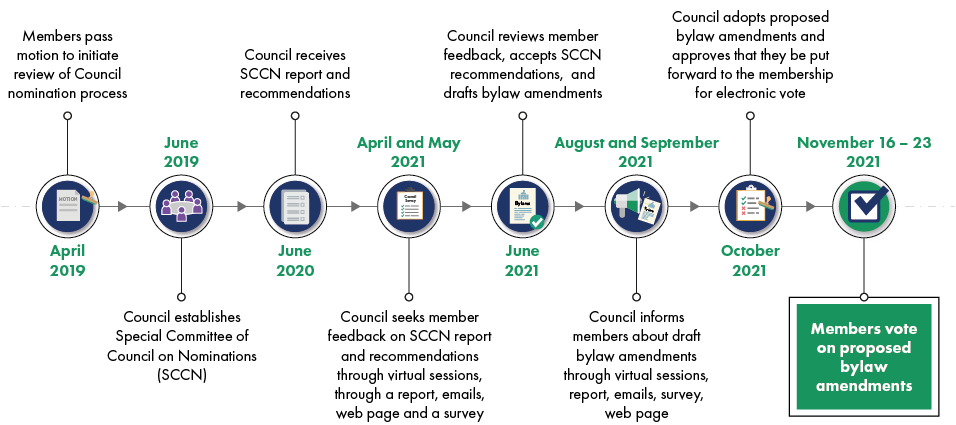Council Nominations Bylaw Vote
Member vote was held from Nov. 16–23, 2021 on proposed bylaw amendments related to the Council nomination process.

Council Nominations Bylaw Vote
After extensive review and engagement with APEGA’s professional members in 2021, Council proceeded with an electronic member vote on proposed bylaw changes related to the Council nomination process from November 16–23, 2021.
Council nominations bylaw vote results
The certified results of this electronic vote show APEGA members are in favour of the proposed bylaw amendments to the Council nomination process.
- Almost 89 per cent of votes cast supported the bylaw amendments.
- Nearly eight per cent of APEGA’s eligible voting members participated in this vote—more than 4,200 licensed professionals.
Questions?
If you have any questions, please email [email protected] for more information.
Voting closed
Voting was open for the Council nominations bylaw vote from Tuesday, November 16, to Tuesday, November 23.
Proposed motion for electronic vote
APEGA licensed professionals were asked to vote on whether they approve the proposed bylaw amendments made by Council on October 7, 2021. The motion that was considered by APEGA licensed professionals for an electronic vote was:
| That the Bylaw amendments adopted by the APEGA Council on October 7, 2021, a copy of which is attached hereto, are approved. |
Read the motion passed by Council regarding the proposed bylaw amendments (PDF)

-
Council nominations will be open to all members in good standing who meet the minimum eligibility requirements.
-
The required competencies for Council positions—over and above those of the engineering and geoscience professions—are clearly defined for each Council cycle, communicated to all members, and consistently used to assess each nominee.
Nominees who are assessed to not possess the adequate competencies to serve on Council will not be placed on the election ballot as candidates.
-
Council will establish and publish the criteria and process for the composition and selection of Nominating Committee members. Council will evaluate and appoint potential Nominating Committee members on specific competency requirements designed to ensure the committee is qualified to assess potential nominees against the required Council competencies.
-
The Nominating Committee will establish and consistently follow a set of clear, consistent processes and detailed procedures to ensure eligible candidates for election have the necessary qualifications and competencies.
-
The nomination process and detailed procedures will be documented, published, and communicated to members. Communication and outreach with members will be expanded to help proactively identify interested members from all corners of APEGA's membership for current and future opportunities.
-
The nomination process and detailed procedures will be published and actively communicated to members through a variety of channels and methods.
What will these bylaw amendments do?
These proposed bylaw amendments will enable the following outcomes.
How we got here
As a regulator, Council’s mandate is to protect the public by providing strategic leadership, financial oversight, and sound governance in accordance with the Engineering and Geoscience Professions Act. The identification and recruitment of qualified candidates to run for Council election is key to Council’s ability to deliver on its mandate.
This process started in 2019, as a response to a motion passed at the 2019 annual general meeting.

Timeline of process leading to Council Nominations Bylaw Vote
- April 2019: Motion passed at APEGA annual general meeting.
- June 2019: APEGA Council established a Special Committee of Council on Nominations to review the process for the nomination of candidates to ensure candidates have the competencies required to fulfil Council’s mandate and to foster diversity.
- June 2020: The final report of the Special Committee was received by Council, which includes six key findings and four recommendations.
- April–June, 2021: All APEGA members were invited to provide feedback on the six key findings and four recommendations of the Special Committee through virtual engagement sessions and a survey. Most participants agreed with the four recommendations. Council reviewed member input and approved the four recommendations.
- August and September 2021: APEGA began the process of informing licensed professionals about the draft bylaw amendments to the nomination process for candidates to serve on Council and provided members with opportunities to comment and ask questions.
- October 2021: APEGA Council reviewed member comments, questions, and survey responses, adopted proposed bylaw amendments, and approved that they be put forward to the membership for electronic vote.
Further reading
Read more background information about the process to date, including member survey reports and information videos explaining the bylaw amendments in depth.
Questions and Answers
The following questions were received during member information sessions.
-
The proposed bylaw amendments are designed to support the development of a nomination process that addresses Council’s need to consistently attract nominees with the competencies and experience required to fulfil Council’s mandate to oversee the regulation of the professions of engineering and geoscience in Alberta. The changes will clarify the nomination process, reduce the potential for bias, and ensure the process is fully transparent to members. The proposed bylaw amendments are available in the report to APEGA licensed professionals (PDF).
-
Yes. The proposed bylaw amendments continue to enable all professional members and professional licensees in good standing who meet the eligibility criteria to enter the Council nomination process. All those entering the nomination process will be assessed by the Nominating Committee against the required competencies identified by Council. Nominees assessed by the Nominating Committee as having the competencies required for that election cycle will be identified as candidates for election and will have their names placed on the election ballot. Nominees assessed by the Nominating Committee as not having the competencies required for that election cycle will not be identified as candidates and will not have their names placed on the election ballot. This process is consistent with best practices in professional regulation and governance.
-
For each election cycle, Council considers current circumstances, upcoming priorities, and potential challenges to identify the competencies it believes are critical, missing, or could benefit from enhancement. This is done to ensure new councillors have the competencies to provide strategic leadership, financial oversight, and sound governance in accordance with the Engineering and Geoscience Professions Act. The updated competencies are widely communicated to all members when Council nominations open, and the description of the required competencies is published on APEGA.ca year-round.
-
The Nominating Committee assesses nominees against the published competencies and identifies those who have the required competencies to become candidates on the ballot for election.
-
Currently, there is no formal process or criteria when building the Nominating Committee roster, and the search for new committee members is limited. Under the proposed bylaw amendments, Council will update and improve the existing Terms of Reference for the Nominating Committee that will be used to:
- identify the competencies required to be a member of the Nominating Committee
- develop formal criteria and processes for its composition, selection, and size
- ensure the process and opportunity for licensed professionals to apply to be a member of the Nominating Committee is fully transparent and shared with APEGA members
The goal is to ensure the Nominating Committee comprises individuals with the necessary skills to assess whether nominees have the required competencies to become election candidates.
-
Yes, the proposed bylaw amendments will provide more structure and clarity on the criteria and process used to form the Nominating Committee.
Currently, there is no formal process used in building the Nominating Committee roster. With the support of APEGA staff, the previous chair of the Nominating Committee works with the incoming chair to build a draft roster for the upcoming Council cycle. Members who have just served on the Nominating Committee are first asked if they are interested in serving another term. Depending on the uptake, the previous and incoming chairs recruit new members. It has become practice for the chairs to look to APEGA’s branch executives, personal networks, and the two major universities to recruit new members. At the Q1 Council meeting, the chairs bring forth to Council a draft roster that complies with the legislative requirements. Council reviews the draft roster and, if satisfied, endorses it for submission to the membership at the upcoming annual general meeting.
Under the proposed bylaw amendments, Council will establish and publish formal, structured processes and criteria for building the Nominating Committee roster. Clear criteria and processes will be put in place and will be communicated to members so everyone knows what the process will be to build the committee roster and what skills and competencies potential committee members must have. The outcome will be a new system that uses a transparent, structured process to build the Nominating Committee roster—one that will be open and inviting and will encourage members to apply to be part of the Nominating Committee.
-
Ensuring all Council members have the skills, knowledge, and attributes to provide strategic leadership, financial oversight, and sound governance is, and will remain, the primary determinant of who is assessed to become a candidate for election to Council. Council will always include, as per the legislation, a minimum number of professional geoscientists and professional engineers. No other new quotas will be imposed.
For APEGA, diversity is about embracing, respecting, and reflecting the differing qualities, characteristics, experiences, and perspectives of its members. To date, the challenge has been successfully reaching out to this diverse range of professionals and supporting those interested in running for Council or other volunteer positions. Consistent with the recommendations of the Special Committee, Council will work harder in the future to inform its broad and diverse membership about the opportunity to run for election to Council and to encourage members to consider the opportunity. These efforts will facilitate the potential of having greater diversity on Council.
-
The draft amendments are consistent with best practices and trends in professional regulation, which emphasize that the role of a professional organization is to carry out its activities and govern its regulated members in a manner that protects and serves the public interest. The amendments are also consistent with recent announcement of the new British Columbia Professional Governance Act and Engineers and Geoscientists Regulation, which replaces the Engineers and Geoscientists Act and only allows those individuals with the required capabilities, qualifications, and skills to be placed on the election ballot. The proposed bylaw amendments also consider recent changes by the Government of Alberta to the Health Professions Act that emphasize the role of professional organizations is to protect and serve the public interest.
-
If the majority of voting members vote to approve the proposed bylaw amendments, the new bylaws will be in effect for the 2022 nomination process to identify candidates for the 2023 Council election.
-
Yes. The four recommendations are intended to work together as a harmonious whole. The four recommendations are:
- Move to a simplified, transparent nomination approach using a formal, structured assessment based on needed skills, knowledge, and attributes.
- Implement an ongoing education and communication strategy to communicate the nomination process to licensed professionals.
- Update the Nominating Committee composition, authority, and process.
- Create a nomination approach that is inviting and easily accessible for licensed professionals and actively works to attract a more diverse pool of qualified nominees for Council, and other volunteer roles, as a means of succession development.
If the proposed bylaw amendments are approved by members by way of an electronic vote in November, all four recommendations will be implemented. Recommendation 1 and 3 will be rolled out concurrently, followed by recommendation 2 to better communicate the overall process. Recommendation 4 will be ongoing. Together, they will create a clear, consistent, transparent, and structured nomination process that will be clearly communicated to members.
Questions?
If you have any other questions that aren't answered here, please email [email protected].
Resources
October 2021
• Read the report to licensed professionals on proposed bylaw changes (PDF)
• Read the report on member views on the clarity of the draft bylaw amendments (PDF)
September 2021
• Read the report on draft bylaw amendments on Council nominations (PDF)
• Watch bylaw amendment information videos on YouTube
June 2020
• Read the full report by the Special Committee of Council on Nominations (PDF)
